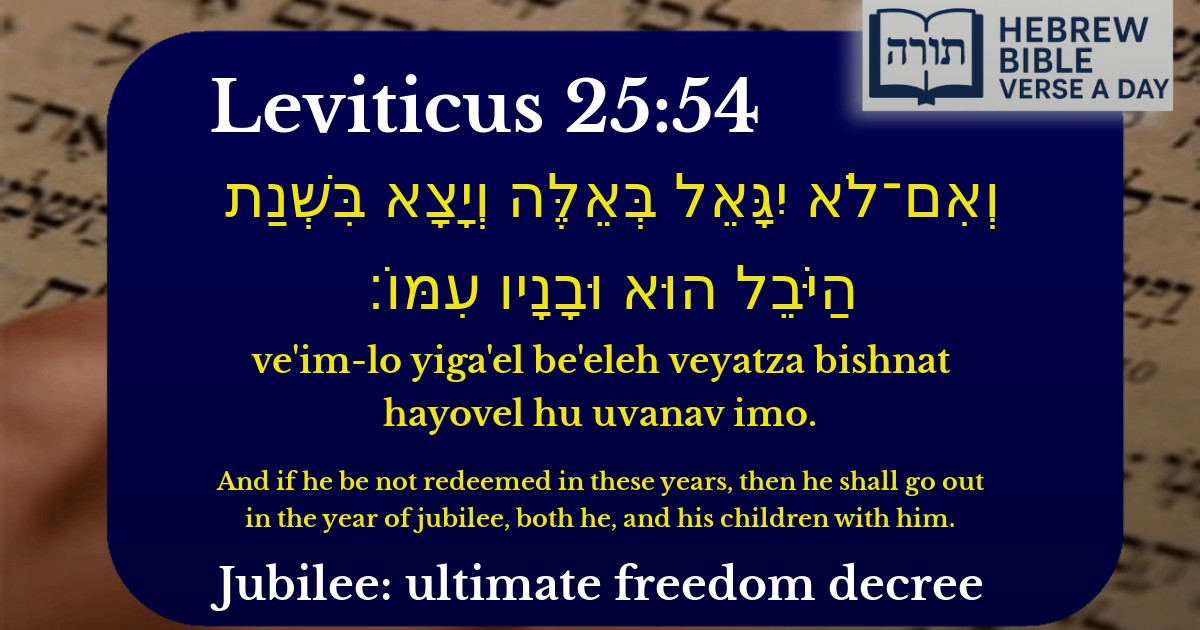Join Our Newsletter To Be Informed When New Videos Are Posted
Join the thousands of fellow Studends who rely on our videos to learn how to read the bible in Hebrew for free!
Hebrew Text
וְאִם־לֹא יִגָּאֵל בְּאֵלֶּה וְיָצָא בִּשְׁנַת הַיֹּבֵל הוּא וּבָנָיו עִמּוֹ׃
English Translation
And if he be not redeemed in these years, then he shall go out in the year of jubilee, both he, and his children with him.
Transliteration
Ve'im-lo yiga'el be'eleh veyatza bishnat hayovel hu uvanav imo.
Hebrew Leining Text
וְאִם־לֹ֥א יִגָּאֵ֖ל בְּאֵ֑לֶּה וְיָצָא֙ בִּשְׁנַ֣ת הַיֹּבֵ֔ל ה֖וּא וּבָנָ֥יו עִמּֽוֹ׃
וְאִם־לֹ֥א יִגָּאֵ֖ל בְּאֵ֑לֶּה וְיָצָא֙ בִּשְׁנַ֣ת הַיֹּבֵ֔ל ה֖וּא וּבָנָ֥יו עִמּֽוֹ׃
🎵 Listen to leining
Parasha Commentary
📚 Talmud Citations
This verse is quoted in the Talmud.
📖 Arakhin 29a
The verse is discussed in the context of the laws of the Jubilee year, particularly regarding the redemption of property and the release of slaves.
📖 Kiddushin 20b
The verse is referenced in a discussion about the laws of Hebrew slaves and their release in the Jubilee year.


Context in Vayikra (Leviticus)
The verse (Vayikra 25:54) discusses the laws of an eved Ivri (Hebrew indentured servant) who was not redeemed by other means before the Yovel (Jubilee) year. According to Torah law, even if the servant was not redeemed through payment or other methods, he and his family must go free when Yovel arrives.
Rashi's Explanation
Rashi (Vayikra 25:54) clarifies that "in these years" refers to the six-year cycles leading up to Yovel. If the servant was not redeemed during those years, Yovel itself becomes the automatic mechanism for his release. Rashi emphasizes that Yovel overrides all prior conditions—even if the servant had originally agreed to a longer term of service, Yovel nullifies such agreements.
Rambam's Legal Perspective
In Hilchos Avadim (Laws of Servants 2:3), the Rambam codifies this law, stating that Yovel is a gezeiras hakasuv (divine decree) that cannot be circumvented. Even if the servant willingly wishes to remain, the Torah mandates his freedom, as the verse states, "he and his children with him"—indicating a complete restoration of family liberty.
Midrashic Insight
The Sifra (Behar 8:9) connects this law to the broader theme of divine ownership: "For they are My servants" (Vayikra 25:55). The Midrash teaches that since all Jews are ultimately servants of Hashem, no human can permanently claim ownership over another. Yovel serves as a reminder that true freedom comes from serving Hashem alone.
Practical Implications